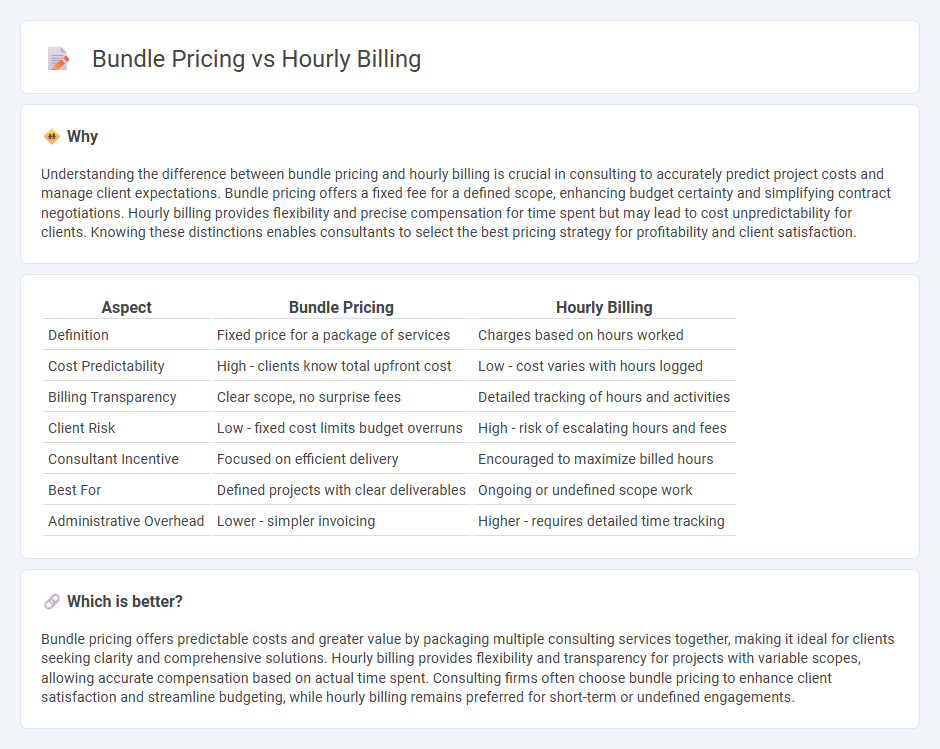
Consulting services can be charged through bundle pricing or hourly billing, each offering distinct financial and strategic advantages. Bundle pricing provides a fixed cost for a defined set of services, enhancing budget predictability and simplifying project management. Explore more about which pricing model best suits your consulting needs and maximizes value.
Why it is important
Understanding the difference between bundle pricing and hourly billing is crucial in consulting to accurately predict project costs and manage client expectations. Bundle pricing offers a fixed fee for a defined scope, enhancing budget certainty and simplifying contract negotiations. Hourly billing provides flexibility and precise compensation for time spent but may lead to cost unpredictability for clients. Knowing these distinctions enables consultants to select the best pricing strategy for profitability and client satisfaction.
Comparison Table
| Aspect | Bundle Pricing | Hourly Billing |
|---|---|---|
| Definition | Fixed price for a package of services | Charges based on hours worked |
| Cost Predictability | High - clients know total upfront cost | Low - cost varies with hours logged |
| Billing Transparency | Clear scope, no surprise fees | Detailed tracking of hours and activities |
| Client Risk | Low - fixed cost limits budget overruns | High - risk of escalating hours and fees |
| Consultant Incentive | Focused on efficient delivery | Encouraged to maximize billed hours |
| Best For | Defined projects with clear deliverables | Ongoing or undefined scope work |
| Administrative Overhead | Lower - simpler invoicing | Higher - requires detailed time tracking |
Which is better?
Bundle pricing offers predictable costs and greater value by packaging multiple consulting services together, making it ideal for clients seeking clarity and comprehensive solutions. Hourly billing provides flexibility and transparency for projects with variable scopes, allowing accurate compensation based on actual time spent. Consulting firms often choose bundle pricing to enhance client satisfaction and streamline budgeting, while hourly billing remains preferred for short-term or undefined engagements.
Connection
Bundle pricing and hourly billing intersect in consulting by offering flexible payment structures tailored to client needs and project scopes. Bundle pricing aggregates multiple services or deliverables into a single fee, simplifying budgeting, while hourly billing charges clients based on the actual time consultants spend on tasks, allowing precise cost tracking. Combining both methods enables consultants to balance predictability and transparency, enhancing client satisfaction and optimizing revenue streams.
Key Terms
Billable Hours
Billable hours quantify the actual time spent delivering services, making hourly billing straightforward and transparent for both clients and providers. Bundle pricing offers fixed fees for grouped services, reducing billing complexity but potentially obscuring precise time tracking compared to hourly rates. Explore deeper insights on how billable hours impact pricing strategies and client satisfaction.
Retainer
Hourly billing calculates fees based on the actual time spent on tasks, often leading to variable costs and less predictability for clients. Bundle pricing within a retainer model offers a fixed fee for a set scope of services, optimizing budgeting and fostering long-term client relationships through consistent support. Explore how retainer agreements can provide cost-effective and streamlined project management tailored to your business.
Fixed Fee
Fixed fee pricing offers clients a clear cost structure by charging a set amount for services, enhancing budget predictability compared to hourly billing, which can lead to uncertain expenses. This pricing model incentivizes efficiency and aligns provider-client interests by delivering defined results within the agreed fee. Explore how fixed fee solutions can streamline your project management and financial planning.
Source and External Links
Hourly Billing | Glossary - Time Tracking Library - Hourly billing is charging clients per hour of work, calculated by dividing company revenue or profits by the total number of hours worked, allowing flexible accounting for project changes and easier billing for in-house client work.
How to Invoice for Hourly Work - To invoice hourly work, you document hours worked and the rate per hour along with detailed tasks, then bill clients according to an agreed schedule such as weekly or monthly, specifying clearly what is charged and the time spent.
Definitive Guide To Billable Hours (And How To Record ... - To manage billable hours, set an hourly rate based on desired salary and expenses, track hours worked, schedule invoice and payments reliably, and keep clear records to ensure accurate client billing.
 dowidth.com
dowidth.com